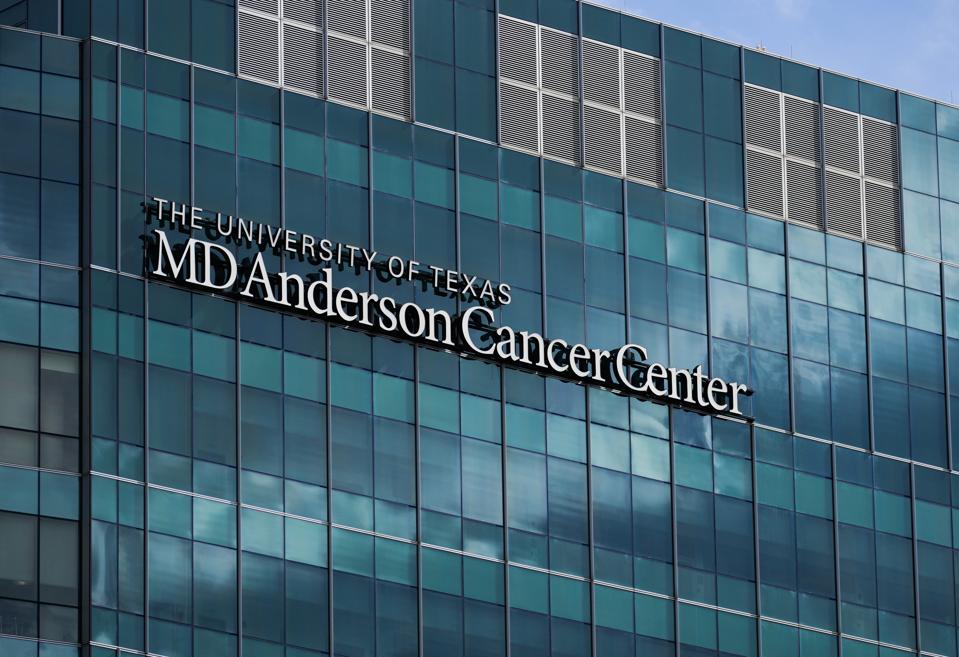
Researchers at the MD Anderson Cancer Center at the University of Texas have shown that COVID-19 mRNA vaccines may increase the survival rate in certain cancer patients. (Jason Fochtman/Houston Chronicle via Getty Images)
Houston Chronicle via Getty Images
Certain individuals with cancer were significantly more likely to survive if they received a COVID-19 mRNA vaccine, according to researchers at the University of Texas MD Anderson Cancer Center.
This result was seen specifically in patients being treated with immune checkpoint inhibitors, a form of immunotherapy. The improvement was independent of the vaccine manufacturer or number of doses that the patients received.
Based on these results, the researchers are designing a randomized phase III clinical trial to determine if an mRNA vaccine should be added to the standard care regimen for certain cancer patients.
The results were first reported on Sunday at the 2025 European Society for Medical Oncology Congress. A peer-reviewed article describing the work in more detail was published on Wednesday in the journal Nature.
Effects Of mRNA Vaccines On Cancer Survival
In a retrospective study of patients at MDACC, researchers focused on individuals with advanced non-small cell lung cancer or metastatic melanoma. Both diseases are difficult to treat, with low survival rates.
The investigators noted that patients who received a COVID-19 mRNA vaccine within 100 days of beginning immune checkpoint inhibitor therapy lived significantly longer than patients who did not receive an mRNA vaccine. For patients with advanced NSCLC, the median survival was 37.33 months among people who received the vaccine. Among unvaccinated people, median survival was 20.6 months.
“The data highly suggest an association between vaccination and clinical outcomes,” lead scientist Dr. Adam Grippin noted.
What Is Immunotherapy?
Immunotherapy is a treatment approach in which components of the immune system are harnessed to attack and destroy cancer cells. Scientists have long known that cancerous cells differ in significant ways from non-cancerous cells. They also have known that components of our immune system can recognize and destroy cancerous cells because of these differences, thereby reducing our risk of developing cancer. Indeed, the 2025 Nobel Prize in Physiology or Medicine recently was awarded for advancements in this very topic.
Various immunotherapy approaches are being used clinically. In CAR T-cell therapy, for example, T cells are removed from the patient, genetically modified to attack tumor cells and then infused back into the patient. In monoclonal antibody therapy, mAbs generated in the laboratory are utilized to attack specific tumor-associated markers. Herceptin, for instance, is a monoclonal antibody that targets the HER2 protein associated with some types of breast cancer.
What Are Immune Checkpoint Inhibitors?
Immune checkpoint inhibitors represent another form of immunotherapy. ICIs target immune checkpoint proteins. These proteins naturally down-regulate the immune system, thereby preventing overblown immune responses. Think of them as brakes on the system.
In some cancers, this regulation is altered. Certain tumor cells, for instance, overexpress the checkpoint protein PD-L1, leading to a less active immune response and a more favorable environment for the tumor. PD-L1 inhibitors, a class of immune checkpoint inhibitors, block PD-L1, thus restoring the effectiveness of the immune response.
Significance Of The COVID-19 mRNA Vaccine
In this study, the investigators specifically looked at the survival of patients who did or did not receive a COVID-19 mRNA vaccine. But the effects they observed on survival presumably are not related to the specific target of the mRNA vaccine. More likely, mRNA vaccines generally augment the immune system.
Indeed, researchers previously showed that other RNA-containing nanoparticles can turn on the anti-cancer immune response. Indeed, other mRNA vaccines may be more effective than the COVID-19 vaccines.
“There is no reason to think that these vaccines are the best possible agents for kick-starting the immune system,” Grippin said of COVID-19 vaccines. “We are also developing next-generation universal mRNA therapeutics that we hope will provide even greater benefits.”
What Comes Next?
As Grippin noted, this retrospective study suggests an association between mRNA vaccines and improved clinical outcomes. But a large-scale randomized trial is needed to verify that, and Grippin confirmed his team is developing one.
“We are currently designing a phase III clinical trial to test whether COVID mRNA vaccines can improve responses to immune therapy in patients with non-small cell lung cancer,” he said.
The researchers hope to start enrolling participants soon at multiple sites, Grippin said. If this trial confirms their preliminary results, then the vaccine could be added to the standard of care. He speculates that promising results could translate into a relatively quick implementation. The proposed therapy involves a vaccine, “that’s already approved, relatively inexpensive and widely available,” Grippin said.
The development of mRNA vaccines dramatically changed the scope of the COVID-19 pandemic. By some accounts, over 2.5 million COVID-related deaths were averted between 2020 and 2024. Additionally, the development of these vaccines has shown us the potential power of the mRNA platform. This study by Grippin and his team continues the story. Perhaps, mRNA vaccines one day also will be credited with limiting cancer-related deaths.

